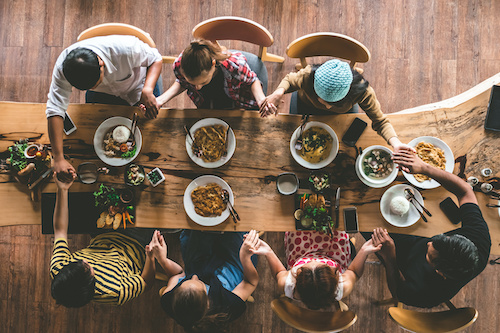
Who Can We Be For Each Other?
A few years ago I was preparing to host a family dinner at my house. My grandparents were visiting from another province and it would be the first time in over a year that our family would be all together. It was autumn and I wanted to make something warm and comforting. I settled on a recipe for creamy butternut squash pasta, which I had never made before so I was feeling a little on edge all day, rushing home after school pick-up so I could get started on the chopping and sautéing. It was a pretty straightforward recipe, and overall turned out quite nice, even though the sausage took much longer to cook than I had anticipated and I forgot to save some of the pasta water to thin out the sauce.
The feeling of this meal has stuck with me because of its vulnerability. Handing each plate of pasta to a family member was like offering them a piece of myself. Here you are, I’ve made this for you, I hope you’ll enjoy it and be nourished. As I ate my own serving I nervously glanced around the table to see the reactions. Did they like it? Hate it? Were they asking for seconds?
I tell this story because it reminds me of how we are meant to live in community with others. Offering ourselves to one another, not really knowing whether or not we will be accepted but believing that love is worth the risk. That true friendship is built on honesty and openness. That even though we’d often prefer to stay where it is safe behind our masks and our walls to intimacy, our hearts are longing to be seen and known.
Although Thanksgiving is not a holiday specifically about the Eucharist, the tradition of breaking bread and drinking wine (or grape juice) is wholly about thankfulness. The Greek word eucharistea means “to give thanks.” Communion is a time to remember Christ and thank Him for giving His life for us, and it is also an invitation.
Paul writes in 1 Corinthians 12:27:
All of you together are Christ’s body, and each of you is a part of it. – 1 Corinthians 12:27 (NLT)
Since we are a part of Christ’s body, which was broken and given for us, then our lives are also gifts to be given, to be shared with others. This is the natural outflowing of gratitude, when we recognize that who we are and what we have are given to us as gifts of love, to be received and celebrated and shared.
In his book “Life of the Beloved” Henri Nouwen writes, “Isn’t a meal together the most beautiful expression of our desire to be given to each other in our brokenness? … Don’t you think that our desire to eat together is an expression of our even deeper desire to be food for one another? … We tend to forget that our real gift is not so much what we can do, but who we are. The real question is not ‘What can we do for each other?’ but ‘Who can we be for each other?’”
Our lives are busy, and sitting down at the dinner table might be the first invitation in the day to pause, the first opportunity to slow down and actually look one another in the eyes. There you are, and here I am. Like the squash pasta I served to my family all those years ago, which was imperfect in its own humble way, I can offer up my imperfect self to the people in my life as a gift, not hiding out of fear but letting my humanity be nourishment to someone else.
As we sit around dinner tables this Thanksgiving it is a chance to ask ourselves, who can we be for each other? As we pass the gravy boats and cranberry sauce and bowls of mashed potatoes, as we share the food that many hands have prepared, we can ask God to show us how we can share more of ourselves with these people, and the ways He wants to reveal Himself through them. Remembering that Christ is over and around and through it all, clothing everything with His grace and light, and giving us every reason to say thanks.
Leave a Reply